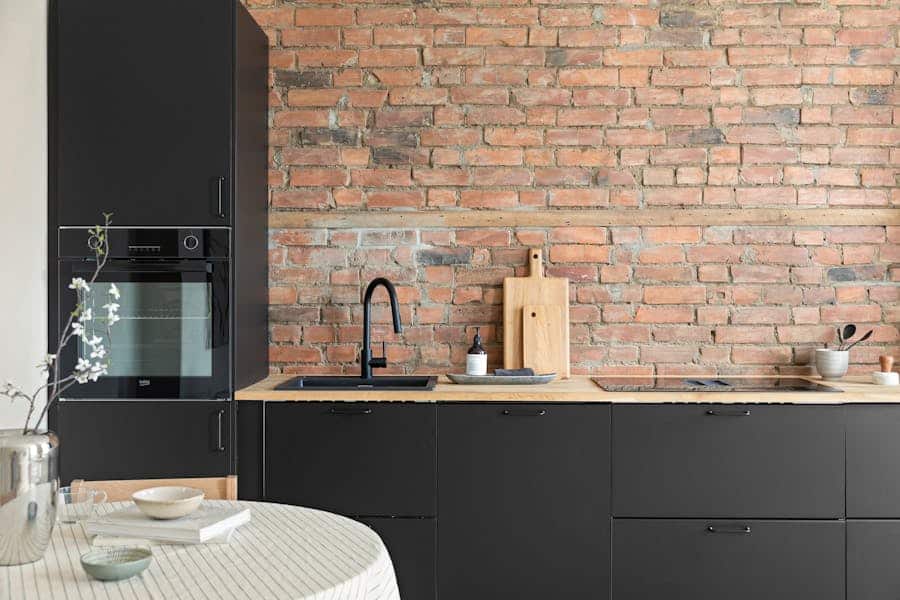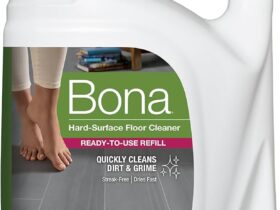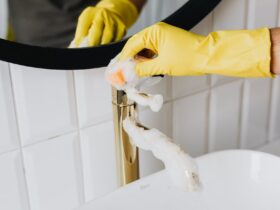To clean a slate sink, use mild soap and water. Avoid abrasive or acidic cleaners.
Slate is durable and can withstand gentle cleaning methods. Using simple soap and water or a mixture of ammonia and water is effective for maintaining the sink’s cleanliness. Harsh chemicals and abrasive products should be avoided as they can damage the slate surface.
Regular cleaning with mild solutions will keep your slate sink looking fresh and clean. Remember to dry the sink with a soft cloth to prevent water spots and maintain its appearance. By following these guidelines, you can keep your slate sink in top condition for years to come.
Initial Preparations
Before diving into the cleaning process, it is essential to make the necessary preparations to ensure a successful cleaning of your slate sink. Proper initial preparations will streamline the cleaning process and yield effective results.
Gathering Necessary Cleaning Supplies
First and foremost, gather all the essential cleaning supplies required for cleaning your slate sink. Having the right tools and products at hand will make the cleaning process efficient and hassle-free.
- Mild dish soap: Opt for a gentle dish soap that is safe for use on slate surfaces.
- Baking soda: Ideal for tackling tough stains on the sink.
- Soft cloths or sponges: Use these to scrub and wipe the sink’s surface.
- Vinegar: Can be used as a natural cleaning agent for slate sinks.
- Protective gloves: Ensure to protect your hands while cleaning.
Clearing The Sink And Surrounding Area
Before commencing the cleaning process, clear out the sink and its surrounding area. Removing any items or debris from the sink will allow you to clean every nook and cranny effectively.
- Remove dishes and utensils: Take out any dishes, utensils, or other items from the sink.
- Clear the drain: Ensure the sink’s drain is free from any blockages or debris.
- Wipe down the surrounding countertops: Clean the countertops around the sink to prevent any dirt or grime from transferring back to the sink.
Cleaning Process
When it comes to cleaning a slate sink, it’s essential to use the right cleaning methods to preserve its natural beauty and durability. The cleaning process involves using gentle products and techniques to avoid damaging the surface of the sink. Below are some essential guidelines for cleaning and maintaining a slate sink:
Using Mild Soap And Water For Regular Cleaning
For regular cleaning, use mild soap and warm water to wipe down the surface of the slate sink. This gentle cleaning solution effectively removes dirt, grime, and grease without causing any damage to the natural stone. Simply dampen a soft cloth or sponge with the soapy water and gently scrub the sink’s surface to maintain its cleanliness.
Avoiding Abrasive Cleaning Products With Acid
Avoid using abrasive cleaning products that contain acid, such as vinegar or lime away, as they can etch and damage the surface of the slate sink. These harsh chemicals can deteriorate the natural stone over time, leading to discoloration and dullness. Opt for non-acidic, gentle cleaning solutions to preserve the integrity of the slate sink.
Specific Cleaning Tips For Different Types Of Stone Sinks
When it comes to cleaning different types of stone sinks, such as limestone or quartz, it’s essential to follow specific cleaning guidelines to ensure their longevity. For example, cleaning a grey stone sink may require washing up liquid and hot water, followed by a clean water rinse to remove deposits and prevent limescale buildup. Similarly, for a quartz sink, using a non-abrasive cleaner and a soft cloth can help maintain its pristine appearance.
Dealing With Tough Stains
Dealing with tough stains on your slate sink can be a challenge, but with the right techniques, you can restore its pristine condition. Here’s how to tackle those stubborn marks and blemishes effectively.
Creating A Paste For Tough Stains
When dealing with tough stains on your slate sink, creating a paste using baking soda and water can work wonders. This natural abrasive paste helps to gently lift and remove stubborn stains without damaging the surface of the sink.
Rinsing And Drying The Sink To Prevent Water Spots
After scrubbing away tough stains, it’s crucial to thoroughly rinse the sink to remove any residue of the paste. Use warm water and a soft cloth or sponge to ensure all traces of the cleaning mixture are gone. Once rinsed, dry the sink with a clean cloth to prevent water spots and maintain its natural sheen.
:max_bytes(150000):strip_icc()/GettyImages-1461658734-471260c212e84ebfb260e5f196408a18.jpg)
Credit: www.thespruce.com
Long-term Maintenance
After cleaning your slate sink, it’s crucial to apply mineral oil regularly to maintain its luster and protect it from stains.
Mineral oil creates a protective barrier that repels water and prevents moisture from seeping into the porous surface of the slate sink.
Regular application of mineral oil not only enhances the natural beauty of the slate but also prolongs its lifespan by preventing cracks and chips.
To prevent limescale build-up on your slate sink, regular cleaning with a mild detergent and water is essential.
Avoid using acidic cleaners like vinegar as they can damage the slate surface over time.
Drying the sink after each use helps prevent water spots and limescale formation, ensuring your slate sink maintains its pristine appearance.
Additional Tips And Warnings
When cleaning a slate sink, there are certain additional tips and warnings to keep in mind to ensure the longevity and appearance of the sink. By following these guidelines, you can effectively maintain the cleanliness and integrity of your slate sink.
Avoiding The Use Of Baking Soda And Vinegar Together
While baking soda and vinegar are commonly used natural cleaning agents, they should be avoided when cleaning a slate sink. When combined, they create a foaming reaction which can potentially damage the slate surface. It’s best to use gentle cleaners specifically formulated for slate or mild dish soap and water to avoid any potential harm.
Special Care For Cloudy Composite Sinks
Cloudy composite sinks require special care to maintain their appearance. When cleaning, avoid using abrasive cleaners or harsh chemicals as they can cause cloudiness or dullness on the surface. Instead, opt for non-abrasive cleaners and a soft cloth to gently clean the sink. Additionally, ensure that the sink is thoroughly rinsed and dried after cleaning to prevent any water spots or residue.
Frequently Asked Questions
How Do You Clean A Natural Stone Sink?
To clean a natural stone sink, avoid acidic products like vinegar. Use mild soap and water, or ammonia and water. Dry with a soft cloth to prevent limescale buildup. For tough stains, make a paste with baking soda and water, scrub gently, then rinse.
How Do You Clean A Grey Stone Sink?
To clean a grey stone sink, use mild soap and water or a mix of ammonia and water. Avoid acidic products like vinegar. Rinse with clean water and dry with a soft cloth.
What Is The Best Way To Clean A Quartz Sink?
To clean a quartz sink, use mild dish soap and warm water. Avoid harsh chemicals or abrasive cleaners. Dry with a clean cloth to prevent water spots.
How To Make A Black Sink Look New Again?
To make a black sink look new again, rinse away loose debris with warm water. Then, use a soft cloth or sponge with mild dish soap to clean the sink’s surface. For tough stains, make a paste with baking soda and water, scrub gently, and rinse.
Dry the sink with a clean cloth to prevent water spots. Avoid using abrasive cleaning products that have acid, such as vinegar.
How Do I Clean A Slate Sink Without Damaging It?
To clean a slate sink, use mild soap and water. Slate can withstand acids and harsh chemicals.
What Cleaning Products Should I Avoid Using On Slate Sinks?
Avoid abrasive products with acid like vinegar or lime away. Stick to soap, water, or ammonia mixtures.
Conclusion
Cleaning a slate sink can be a daunting task, especially if you’re not aware of the dos and don’ts. However, with the right products and techniques, you can clean your slate sink with ease. Avoid using abrasive cleaning products that contain acid, such as vinegar, lime away or similar products.
Instead, opt for simple soap and water, or a mixture of ammonia and water. With these tips, you can keep your slate sink looking clean and new for years to come.










Leave a Reply